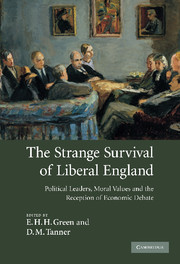 The Strange Survival of Liberal England
The Strange Survival of Liberal England Book contents
- Frontmatter
- Contents
- Acknowledgements
- List of abbreviations
- List of contributors
- Introduction
- Part I Economic ideas and political leaders
- 1 Utilitarian or Neo-Foxite Whig? Robert Lowe as Chancellor of the Exchequer
- 2 Political economy, the labour movement and the minimum wage, 1880–1914
- 3 Economic interpretations of war: American liberals and US entry into World War I
- 4 Political leadership, intellectual debate and economic policy during the second Labour government, 1929–1931
- Part II The use and abuse of economic ideas: Keynes and his interpreters
- Part III Economic forces and their significance
- Index
1 - Utilitarian or Neo-Foxite Whig? Robert Lowe as Chancellor of the Exchequer
Published online by Cambridge University Press: 04 July 2009
- Frontmatter
- Contents
- Acknowledgements
- List of abbreviations
- List of contributors
- Introduction
- Part I Economic ideas and political leaders
- 1 Utilitarian or Neo-Foxite Whig? Robert Lowe as Chancellor of the Exchequer
- 2 Political economy, the labour movement and the minimum wage, 1880–1914
- 3 Economic interpretations of war: American liberals and US entry into World War I
- 4 Political leadership, intellectual debate and economic policy during the second Labour government, 1929–1931
- Part II The use and abuse of economic ideas: Keynes and his interpreters
- Part III Economic forces and their significance
- Index
Summary
Peter Clarke's first book Lancashire and the New Liberalism luxuriated in the grassroots of politics, but insofar as it acknowledged any individual heroes they were a present and future Chancellor of the Exchequer, Lloyd George and Winston Churchill. These two were pioneers of the progressive policies that were the subject of Clarke's second book, Liberals and Social Democrats. His third book, The Keynesian Revolution in the Making, took for its context the policies of Churchill and the man who succeeded him as Chancellor, Philip Snowden. Finally The Cripps Version, Clarke's sixth and most recent book, is the biography of a politician best remembered as the ‘austerity Chancellor’. This chapter, on two other one-time residents of 11 Downing Street, William Gladstone and Robert Lowe, is also relevant to Clarke's fourth book, A Question of Leadership: Gladstone to Thatcher, because along with Disraeli these were the first two ‘political’ Chancellors in the sense of enjoying a prestige independent of the Prime Minister of the day. Furthermore, their ambiguous relationship illustrates one of the main themes of Clarke's oeuvre, and also of the present volume: the way in which agreements over economic theory and policy can often mask – just as disagreements can often reflect – philosophical differences that have nothing directly to do with economics.
- Type
- Chapter
- Information
- The Strange Survival of Liberal EnglandPolitical Leaders, Moral Values and the Reception of Economic Debate, pp. 37 - 61Publisher: Cambridge University PressPrint publication year: 2007
- 1
- Cited by
